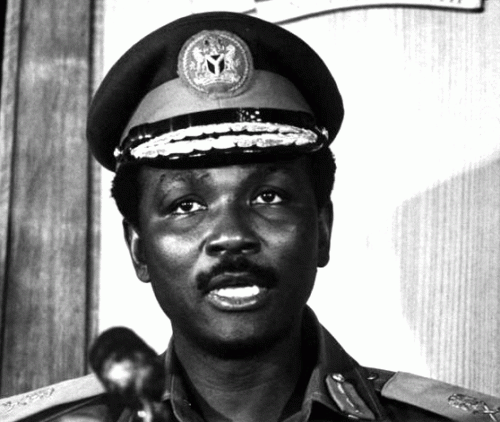Yakubu Gowon, Nigerian head of state during its civil war, was born in Northern Nigeria in 1934. Gowon joined the Nigerian army in 1954, and became a Second Lieutenant on his 21st birthday in 1955. From this point until 1966, Gowon was a professional soldier with no interest in politics. In 1966 he was a Lieutenant Colonel. When the mostly Igbo military junta, which overthrew the Nigerian civilian government in January 1966, was itself overthrown in September of that year, most of the senior military officers who survived both coups were driven out of the Army. Leadership of the country then fell onto 32-year-old Gowon.
Gowon’s government first had to reestablish order. Anti-Igbo rioting broke out especially in Northern Nigeria. By the end of 1966 when more than 30,000 eastern Nigerians were killed, the Military Governor of Eastern Nigeria, Colonel Chukwuemeka Odumegwu Ojukwu, called for his region to secede from the Nigerian nation and create its own government. When a last minute meeting between the two leaders failed to establish a compromise, Gowon declared a state of emergency and quickly divided Nigeria into 12 new states; two of these states were in the Eastern region. They were formed to divide the Igbo people and undermine Ojukwu’s support. In response Colonel Ojukwu declared the state of Biafra on May 30, 1967, initiating a bloody three-year civil war between 1967 and 1970.
Gowon, with the support of the United States, Great Britain, and the Soviet Union, isolated Biafra diplomatically and the Nigerian Army and Navy isolated it physically. By the second year of the war the Nigerian government occupied well over half of the original Biafra. When resistance by the Igbo stiffened, the government on June 30 banned all Red Cross aid to Biafra and two weeks later restricted food supplies. What remained of the secessionist state was starved into submission. During the 30 month conflict more than one million of the country’s thirteen million people had died of starvation. On January 12, 1970, Biafra surrendered.
After the surrender General Gowon instituted a policy of “no victor, no vanquished.” Winning this civil war was the high point of Gowon’s regime. His attempt to enforce his 3R program of reconstruction, rehabilitation, and reconciliation across the country failed. While the idea was laudable, its implementation was flawed and thus most of Nigeria, regardless of the side they were on during the recent civil war, lost faith in Gowon and his administration. His promise to return Nigeria back to civil rule by 1976 was broken and the rapid growth of corruption in his administration further eroded the country’s confidence in him.
General Yakubu Gowon was overthrown in a bloodless coup on July 29, 1975 and replaced by General Murtala Muhammed. He left immediately for Great Britain. While there, he studied at the University of Warwick and graduated with a doctoral degree in political science. Yakubu Gowon returned to Nigeria in 1983, where he currently resides.

